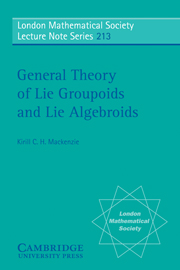Book contents
- Frontmatter
- Contents
- Prologue
- Introduction
- Preface
- TERMINOLOGY AND NOTATION
- ACKNOWLEDGEMENTS
- PART ONE THE GENERAL THEORY
- PART TWO THE TRANSITIVE THEORY
- 5 Infinitesimal Connection Theory
- 6 Path Connections and Lie Theory
- 7 Cohomology and Schouten Calculus
- 8 The Cohomological Obstruction
- PART THREE THE POISSON AND SYMPLECTIC THEORIES
- Appendix
- Bibliography
- Index
8 - The Cohomological Obstruction
from PART TWO - THE TRANSITIVE THEORY
Published online by Cambridge University Press: 05 April 2013
- Frontmatter
- Contents
- Prologue
- Introduction
- Preface
- TERMINOLOGY AND NOTATION
- ACKNOWLEDGEMENTS
- PART ONE THE GENERAL THEORY
- PART TWO THE TRANSITIVE THEORY
- 5 Infinitesimal Connection Theory
- 6 Path Connections and Lie Theory
- 7 Cohomology and Schouten Calculus
- 8 The Cohomological Obstruction
- PART THREE THE POISSON AND SYMPLECTIC THEORIES
- Appendix
- Bibliography
- Index
Summary
This chapter is concerned with the integrability problem for transitive Lie algebroids, and the single cohomologieal obstruction which gives a complete solution in that case. For general Lie algebroids, the problem of integrability has recently been completely solved; see the Notes to this chapter and the Appendix for references on the general problem.
We begin in §8.1 with a rapid summary of the most simple interesting case; most readers will know this material from accounts of geometric prequantization. In §8.2 we prove that a transitive Lie algebroid on a contractible base admits a flat connection; in terms of §5.4 this shows that every transitive Lie algebroid is locally trivial. At the same time 8.2.1 is a strong form of local integrability for transitive Lie algebroids. This result leads to a classification of transitive Lie algebroids in terms of what we call systems of transition data; these consist of a family of local Maurer–Cartan forms subject to a (nonabelian) cocycle condition twisted by a cocycle for the adjoint bundle. This classification is an exact infinitesimal analogue of the classification of principal bundles by-transition functions.
For the Lie algebroid of a locally trivial Lie groupoid, the system of transition data is obtained from a groupoid cocycle by differentiation. For an abstract transitive Lie algebroid, attempting to reverse this process leads to the eohomologieal integrability obstruction class. This is the subject of §8.3.
- Type
- Chapter
- Information
- General Theory of Lie Groupoids and Lie Algebroids , pp. 311 - 336Publisher: Cambridge University PressPrint publication year: 2005



